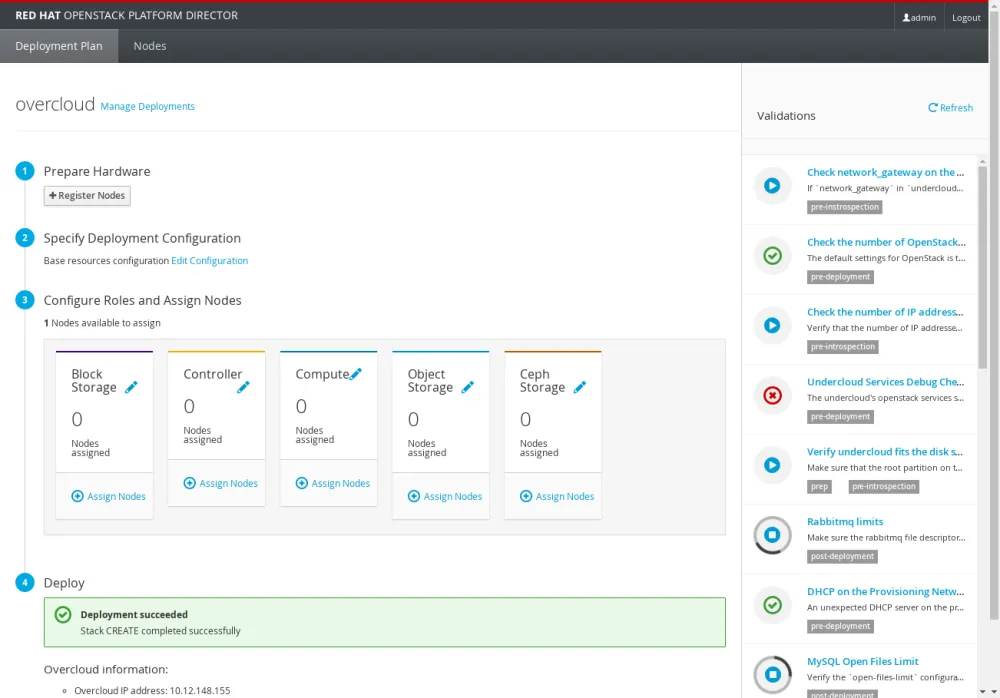UPDATE Jan 16th: new OSP10 + CEPH 2 Hyper Converged Infrastructure Reference Architecture
It’s that time of the year. We all look back at 2016, think about the good and bad things, and wish that Santa brings us the gifts we deserve. We, at Red Hat, are really proud to bring you a present for this holiday season: a new version of Red Hat OpenStack Platform, version 10 (press release and release notes). This is our best release ever, so we’ve named it our first Long Life release (up to 5 years support), and this blog post will show you why this will be the perfect gift for your private cloud project.
We know installing OpenStack in the past was cumbersome due to the extensive use of the command line, so in this release we’re bringing a new Graphical User Interface for the Director. This new UI is a first step in our goal to simplify OpenStack deployments, and you’ll see how much it will improve in future releases, thanks to the extensive feedback we’ve collected in these previous months of internal testing.

Another feature that has finally passed all of our tests is Distributed Virtual Routing (DVR), which is now production-quality (despite some limitations in functionality), and completely automated in Director with very simple configuration changes.
Another gift to our beloved customers, who told us they wanted a simplified management of OpenStack services, is the move of all stateless services to SystemD, greatly simplifying the Pacemaker configuration. We rely on Pacemaker only for stateful services such as databases, virtual IPs, etc. Everything else, all the other OpenStack processes, are now running as regular Systemd services.
Furthermore, OSP 10 gives you the possibility to define your own Roles thanks to Composable Services, and fully customize the OpenStack deployment architecture. You can split the Network services into its own servers, same with Swift or Ceilometer, etc. The caveat is that at the moment you cannot migrate an OSP 9 monolithical controller to a customized one in OSP 10, but that will be solved very soon.
For those who are already using Ceph as a storage backend, we offer automated upgrades from Ceph 1.3 to Ceph 2 at the same time that you upgrade OSP 9 to 10. Moreover, if you want to experiment with the new Shared Filesystem service (Manila), but you don’t have a Netapp backend (currently the only fully supported), we offer CephFS as a Tech Preview. This way, you can truly leverage Ceph as the definitive unified storage pool for all your cloud needs.
One more thing, for those early adopters who have been really patient this previous year with advanced tuning and manual NFV deployments, OSP 10 can automatically deploy an NFV infrastructure. You can deploy compute nodes with either SR-IOV enabled or OVS+DPDK. Both options come with proper resource partitioning and “tuned” profiles to help you fine-tune and get the maximum performance for your network packets. For more information, check out our new documentation about NFV: NFV product guide, NFV planning guide, NFV configuration and tuning and the NFV Reference Architecture for Mobile Networks (vEPC).
In addition to all the above great features, there are many other new features in Tech Preview.
- Thanks to RHEL 7.3, we provide a Conntrack backend for OVS, which will improve network performance and reduce operational complexity.
- We’re also offering the option to deploy Hyper Converged Infrastructure by collocating the Ceph OSD with the compute nodes. The updated HCI reference architecture can be viewed here.
- Finally, stay tuned for the option to deploy latest Open Daylight drivers for Neutron and the ODL controller via Director, something that will be released early 2017
Ready to learn more?
We provide more insights about OSP10 in our press release. You can also check out our updated Red Hat OpenStack Platform page, where you can learn more about the most common use-cases, success stories, overview of our partner offers and our own consulting and training services. Additionally, you can download a free 60-day trial.
Or visit our customer portal, where you can:
- View the list of supported components and certified plug-ins
- Browse the official documentation page
- Check out the version 10 release notes
À propos de l'auteur
Plus de résultats similaires
Sovereign AI architecture: Scaling distributed training with Kubeflow Trainer and Feast on Red Hat OpenShift AI
End-to-end security for AI: Integrating AltaStata Storage with Red Hat OpenShift confidential containers
Data Security 101 | Compiler
Technically Speaking | Build a production-ready AI toolbox
Parcourir par canal
Automatisation
Les dernières nouveautés en matière d'automatisation informatique pour les technologies, les équipes et les environnements
Intelligence artificielle
Actualité sur les plateformes qui permettent aux clients d'exécuter des charges de travail d'IA sur tout type d'environnement
Cloud hybride ouvert
Découvrez comment créer un avenir flexible grâce au cloud hybride
Sécurité
Les dernières actualités sur la façon dont nous réduisons les risques dans tous les environnements et technologies
Edge computing
Actualité sur les plateformes qui simplifient les opérations en périphérie
Infrastructure
Les dernières nouveautés sur la plateforme Linux d'entreprise leader au monde
Applications
À l’intérieur de nos solutions aux défis d’application les plus difficiles
Virtualisation
L'avenir de la virtualisation d'entreprise pour vos charges de travail sur site ou sur le cloud

